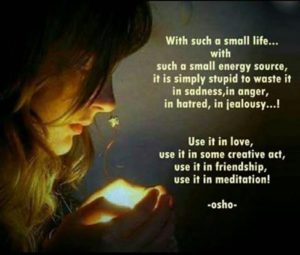Talks in Uruguay:The Transmission of the Lamp
Het boek “The Transmission of the Lamp” is de de derde serie lezingen die Osho In Uruguay gegeven heeft. Osho reisde daar met een klein groepje discipelen. De thema’s betroffen vooral de esoterische  kant van de spirituele zoektocht. Hij legt uit over ‘getuige zijn’ of ‘waarnemen’ als een 24uurs techniek die overal en altijd toegepast kan worden. Verder zijn er toespraken over de subtiele vibraties van een Meester, over orakels, over de wonderbaarlijke kracht van ontspanning, over astrale projectie, vorige levens, conditionering en over de oorsprong van depressie.
kant van de spirituele zoektocht. Hij legt uit over ‘getuige zijn’ of ‘waarnemen’ als een 24uurs techniek die overal en altijd toegepast kan worden. Verder zijn er toespraken over de subtiele vibraties van een Meester, over orakels, over de wonderbaarlijke kracht van ontspanning, over astrale projectie, vorige levens, conditionering en over de oorsprong van depressie.
Osho geeft aan: “Terwijl het leven zo kort is en er maar zo’n kleine bron van energie is, is het eenvoudig dom als je het gaat verspillen met droefheid, met boosheid, met haat of met jaloezie. Gebruik het in liefde of door iets creatiefs te doen, gebruik het in vriendschap of i n meditatie. Doe er iets mee dat zegt dat je je gaat verheffen. En hoe hoger je gaat, des te meer bronnen van energie komen er beschikbaar voor je.
n meditatie. Doe er iets mee dat zegt dat je je gaat verheffen. En hoe hoger je gaat, des te meer bronnen van energie komen er beschikbaar voor je.
Op het hoogste punt van bewustzijn ben je bijna een god.Maar dat moment staan we niet toe om te laten gebeuren met ons. We gaan maar steeds door met in alsmaar donkerder ruimtes te vallen waar we bijna tot levende doden worden.
Het ligt in je eigen handen.”
Transmission of the Lamp, Talks in Uruguay # 23.
Het boek is verkrijgbaar als audio book bij Osho International.
This book is the third from the series given in Uruguay on OSHO’s world tour. As OSHO responds to questions from the small group of dedicated disciples with him, he reveals much about the esoteric side of the spiritual search, He explains ‘witnessing’ or ‘watching’ as a 24-hour technique that can be done anytime, anywhere; and talks on the subtle vibrations of a Master, oracles, the miraculous powers of relaxation, astral projection, past lives, conditioning and the origins of depression.
Impression of the Transmission of the Lamp
Reality Is Far Richer than Imagination
Talk # 42 of the Series, The Transmission of the Lamp
“That is your problem.
“Next question.
Osho,
There is a story of a disciple who comes to see his master and asks him whether man is free.
The master tells his disciple to stand up and to lift one of his feet off the ground. The disciple, standing on one leg – and the other one in the air – understands less than before.
Now the master asks him to also lift the other foot off the ground.
Osho, can you speak on the difference between freedom for and freedom from?”
“Freedom from is ordinary, mundane. Man has always tried to be free from things. It is not creative. It is the negative aspect of freedom.”Freedom for is creativity. You have a certain vision that you would like to materialize and you want freedom for it.
“Freedom from is always from the past, and freedom for is always for the future.
 “Freedom for is a spiritual dimension because you are moving into the unknown and perhaps, one day, into the unknowable. It will give you wings.
“Freedom for is a spiritual dimension because you are moving into the unknown and perhaps, one day, into the unknowable. It will give you wings.
“Freedom from, at the most, can take away your handcuffs. It is not necessarily beneficial – and the whole of history is a proof of it. People have never thought of the second freedom that I am insisting on; they have only thought of the first – because they don’t have the insight to see the second. The first is visible: chains on their feet, handcuffs on their hands. They want to be free from them, but then what? What are you going to do with your hands? You may even repent that you asked for freedom from.
“It happened in the castle of the Bastille – I have told you – in the French Revolution it was the most famous French prison, it was reserved only for those who were sentenced to live in jail for their whole lives. So one entered the Bastille alive but never came out alive – only the dead bodies came out.
“And when they put on the handcuffs, the chains, they locked them and threw the keys in a well which was inside the Bastille – because they were not needed. Those locks would not be opened again so what would be their use?
“There were more than five thousand people. What is the use of keeping five thousand peoples’ keys and maintaining them unnecessarily?
“Once they have entered their dark cells, they have entered them forever.
“The French revolutionaries necessarily thought that the first thing that had to be done was to free the people from the Bastille.
“It is inhuman to put somebody for any act whatsoever into prison in a dark cell just to wait for his death which might come fifty years afterwards, sixty years afterwards. Sixty years of waiting is an immense torture to the soul. It is not punishment, it is vengeance, revenge, because these people disobeyed the law. There is no balance between their acts and the punishment.”
